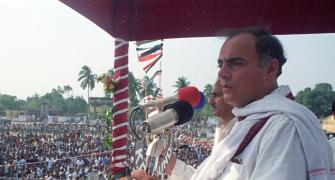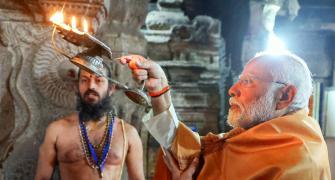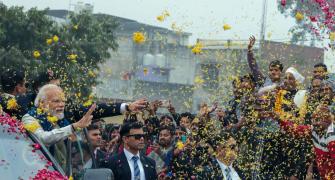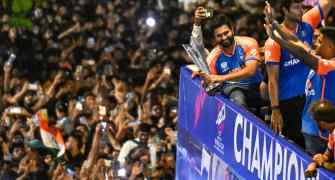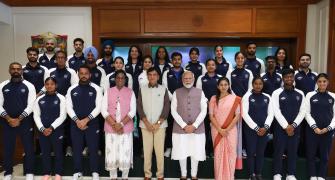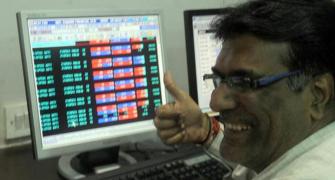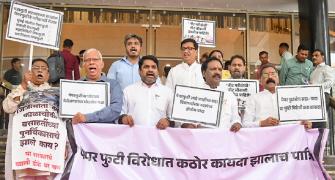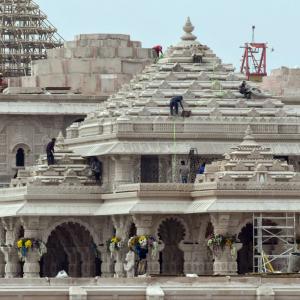Narendra Modi has proved through execution of this event in Ayodhya that amongst all his contemporaries in politics he knows ordinary Indians like none other, notes Sheela Bhatt.

There is a tsunami of support for the Ram temple in Ayodhya amongst Hindus in the Hindi belt of India. None can deny that all over India there is tremendous interests in the pran pratishtha of the Ram temple in Ayodhya.
There are a few ifs and buts while acknowledging the undercurrent for the Ram temple, but it is visible that the RSS and BJP crusade has achieved its impossible goal by resurrecting enormous Ram literature, Ram bhajans of the Ganga belt and recalling of mythical stories of Ram through social media.
For the first time after Independence, India is witnessing a stunning mix of religion, government, politics, temple tourism, construction of a permanent Hindu religious infrastructure, popular use of traditional temple music, mythological literature and religious rituals at one public event.
There are many shades of Indian views about the Ayodhya event.
a. There are overwhelming numbers of Hindus who think construction of the Ram temple is the desirable end to the five centuries-old dispute. They are overjoyed to see the emergence of a magnificent temple. Modi and the Sangh Parivar has amplified this narrative and have joined these Ram bhakts to start a new chapter in Indian history.
b. Another set of people think the demolition of the Babri mosque in December 1992 was a grave sign of intolerance and one of the saddest days in India. Their argument has gone a little bit into the background after the Supreme Court judgment of 2019 that clearly gave 'land ownership' to the Hindu side.
c. Also, there is visible division within the Muslims. Barring a few strong political and radical voices, most Muslims are not against the Ram temple, but most of them feel confused about the future of Indian society. There are many Indians who would like to see the event putting an end to the long-standing dispute that divided Hindus and Muslims.
d. There are anti-BJP secular-liberals who strongly believe in a strict separation of religion and State and who think this is a non-negotiable condition to run a multi-cultural country like India.

However, all different opinion holders need to remember that without the Supreme Court judgment, the ongoing construction of the Ram temple and the pran pratishtha would not have been as peaceful as it is now.
The Congress has boycotted the January 22 event saying that the event is a political project of the BJP/RSS and that religion is a personal matter.
The Congress had no option but to reject the invite of the Ramjanambhoomi Trust in view of the complete identification of Modi and the BJP with the event, but the language of its media statement has hurt the Congress politically.
The Congress's press release did not directly address the Ram bhakts which it needed to relate to. Nor did it checkmate the BJP by launching an equally vigorous counter campaign.
Congress leaders doesn't have the wherewithal to participate in such a mass connect programme. Also, their Nehruvian ideology that believes in separation of the State and religion would have restrained them to do convincingly what Modi is doing right now.
Modi's 11 day-long fast, sleeping on mats, visiting temples and displaying religiosity before cameras is highly political for his critics, but intensely customary as it can be for Ram bhakts.

However, in matters of religion, culture or nationalism no event of size of January 22 can be dismissed as the BJP's propaganda only.
There are many layers to what Modi has tried to achieve in Ayodhya.
He has proved through execution of this event in Ayodhya that amongst all his contemporaries in politics he knows ordinary Indians like none other.
Through his party machinery and cadres of the Sangh, Modi has cemented his personality and his karma with the emergence of the Ram temple. He forced all contemporary political leaders to follow him to Ayodhya as he has taken the lead many decades earlier. The Congress failed to sense this climax as soon as the Supreme court judgment arrived in 2019.
In Delhi many staunch critics of building the Ram temple where once the Babri mosque stood claim that this is the 'new world order'.
This is not a new India.
This deeply religious India is not at all a new India.
Those who are supporting Modi's efforts in building a Ram temple aren't people who have formed a so-called new world order.
It was the Nehruvian India of 1947 to the late 1980s that was the new Indian order.
In Nehru's towering presence, the non-Nehruvian India was low key as the Congress was striving to build a new India based only on scientific temper and was pushing the value system inspired by Western philosophers.
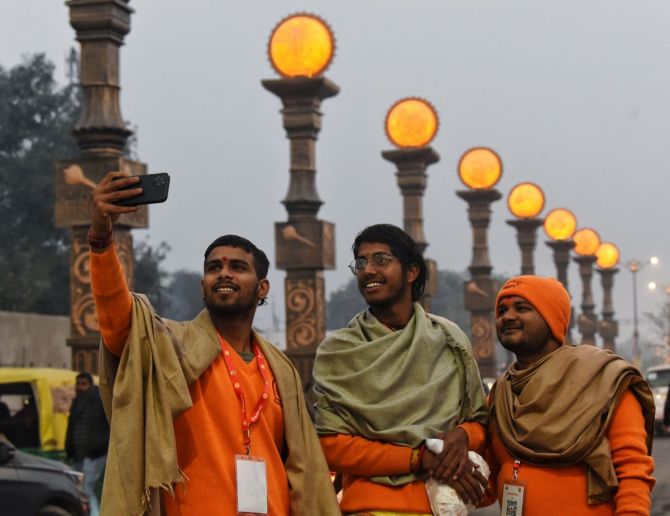
For a fortnight, I have been asking many people in different states a straight question if the current visible support for the Ram temple in Ayodhya is real or if it is whipped up only due to 'marketing' by the Sangh Parivar.
The BJP's programme to reach out door-to-door to Ram bhakts and mobilise its own cadre 80 days before the Lok Sabha election have helped fuel religious passion, but even Congress supporters privately agree, in my conversatiosn with them, that an overwhelming support for the Ram temple in Ayodhya exists and it goes beyond Modi and the BJP.
There is not an iota of surprise in the support that Modi and the BJP is getting because 'Ram, Ayodhya and Ramjanambhoomi' have always been an emotional issue.
With the BJP's heady mix of religion and politics many other things have got added.
Majorly, a huge availability of literature on Ram, of Ram and many versions of the Ramayan have got resurfaced in popular culture. Some of this literature belongs to the 17th and 18th centuries.
Bhakti sangeet binds North and South India. In the current season, Ram bhajans spread through social media have re-created magic of Ram.

The BJP has exploited the opportunity to activate its cadres by asking to clean temples in the villages and towns, by reaching out to voters with Akshat, by requesting them to lit diyas on January 22. Also, the message was sent by the RSS top brass that no radical or harsh slogans should be coined or raised while visiting people's homes.
This week, Modi has told his Cabinet ministers to mobilise maximum numbers of Ram bhakts in their respective constituencies to visit Ayodhya after January 22.
On social media many versions of Shabri's 'Ram aayenge, aayenge... meri jhopadi main Ram aayenge...' have been played by millions. There is revival of Tulsidas's dohas in with modern tunes and with the help of modern technologies it sounds fresh and stirring. Modi's temple tours all over India have contributed in creating a mahaul (ambience) among his followers.

Once more, the construction of the Ram temple has turned the passive emotions of people for Ram into active support. Ram is considered the seventh avatar of Lord Vishnu and that makes him special in the non-Hindi belt too.
Feature Presentation: Aslam Hunani/Rediff.com

